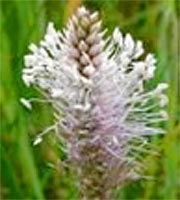|

News September 2015
|
|
|
 We had a pleasant evening in August (July was unseasonably cold) for the last of our verge walks this year and spotted over 50 different wildflowers, including twayblades and hoary plantain, on the stretch of verge we surveyed north of Thorngrafton. We saw alkali indicative agrimony within a few paces of acid loving heather as the depth of peaty soil overlaying the Whin limestone decreased - both plants flowering late in the year and a valuable resource for bees. We had a pleasant evening in August (July was unseasonably cold) for the last of our verge walks this year and spotted over 50 different wildflowers, including twayblades and hoary plantain, on the stretch of verge we surveyed north of Thorngrafton. We saw alkali indicative agrimony within a few paces of acid loving heather as the depth of peaty soil overlaying the Whin limestone decreased - both plants flowering late in the year and a valuable resource for bees.
Our next step with this project is to organise a meeting with the managers of our road verges and, as there has been particular concerns raised about A69, we're hoping that Transition Tynedale will partner us and any meeting will most likely be in Hexham.
|

|
STS congratulates R Harding on gaining the most points in the fruit and veg classes at the Gilsland Show and winning the Sustainability Bowl.
|
From Real Seeds:
~ WHY YOU SHOULD SAVE YOUR OWN SEED ~
- Until recently, every gardener in the world saved their own seed. And every gardener was, therefore, a plant breeder.
- They simply saved the seed of the plants that did best for them, and which they liked most. Although simple, this was efficient.
- Each gardener was maintaining a slightly different strain of each vegetable, and this made for a huge living genebank that was very resilient against disease or climate change.
- If things changed so that your cabbages didn't do well, someone down the road had a slightly different one that would cope.
- This has worked very well for the past 11,000 years. That includes the Bronze Age, the building of the Pyramids, the rise and fall of all the major empires.
- Every year, without even thinking about it, millions of people added to the achievements of their ancestors to maintain and improve the previous years' varieties. Because their seed was real, open-pollinated seed, every seed was a bit different, so it was widely adapted, but also adaptable - it could cope with all sorts of change.
- Now, we have thrown this all away. In the past 40 years, almost all these adaptable local strains have been lost.
- Gardeners have forgotten how to save their own seed. They are sold hybrids, where every seed is identical, in every packet, year after year - no adaptability for different soils, or for changes in climate over time.
- And because these hybrid seeds are all the same in every field in every country, people have to bludgeon the environment into some sort of 'standard' growing medium with fertilisers and chemicals, to grow their standardised seeds.
- Should the climate change, or the supply of cheap oil (to make all these chemicals) dry up, then these hybrids will do badly, and there will be no real seeds left to breed from.
- Profits for the seed companies now, but disaster in the future . . . real farming is a project that has been ongoing for millennia, but now in the height of our tiny period of cheap oil, we think we know better and have turned it into just another industrial process.
- People's food should represent stored sunlight and water, but 90% of its calories come from oil these days - for the ploughing, spraying, fertiliser, transport.
- When the oil runs out, who will have the real seeds that can grow without it?
We'll be holding another seed swap next year so please save seeds from your own veg and bee-friendly flowers. Real Seeds have a comprehensive set of instructions for saving vegetable seed: http://www.realseeds.co.uk/seedsavinginfo.html
|

|
 |
Hadrian's Wall Farmers' Market needs a new organiser as Wendy Bond is shelving her filofax after 10 successful years. Can you help?
Please contact Wendy 016977 47448.
The September market is on Sunday 13th and Wendy's last market will be on Sunday, October 11th.
|
|
|
|
Sheep snippets!
|
 'Addicted to Sheep', a film featuring the lives of a farming family in the North Pennines will be shown in The Forum Cinema, Hexham, on 4th September at 7.30pm. The film maker, Magali Pettier, will be there to answer questions immediately after the screening. 'Addicted to Sheep', a film featuring the lives of a farming family in the North Pennines will be shown in The Forum Cinema, Hexham, on 4th September at 7.30pm. The film maker, Magali Pettier, will be there to answer questions immediately after the screening.
“Reminding us that farming should never be just about genetics & margins” Tweet from Tom Levitt, Guardian journalist.
Local farmers are selling their annual lamb crop at this time of year but, due to factors entirely beyond their control, prices are low. The first week of September is British Lamb Week. Farmers, butchers and restaurateurs are urging everyone to enjoy lamb this week. Follow the campaign: @LoveBritishLamb and #BritishLambWeek on Twitter, and /LoveBritishLamb on Facebook.
|

Bicycle wheels will be spinning along Tynedale’s roads as the Tour of Britain cycle race whizzes along on Thursday 10th September and the Gilsland’s Fibre Fridays group's wheels will be spinning fleece all week - a different local breed of sheep during every day of the Race.
There will be a display about all the breeds and their wool in Gilsland Village Hall, do drop in and take a look. |
|
|

|
South Tyne Sustainability aims to reduce the impact of the community of Haltwhistle and surrounding villages on our environment. This will help individuals, families and our community save money and resources and ensure a more sustainable future for us all.
To join STS contact Sue Seymour, sue@mosspeteral.com 016977 47359
|
|